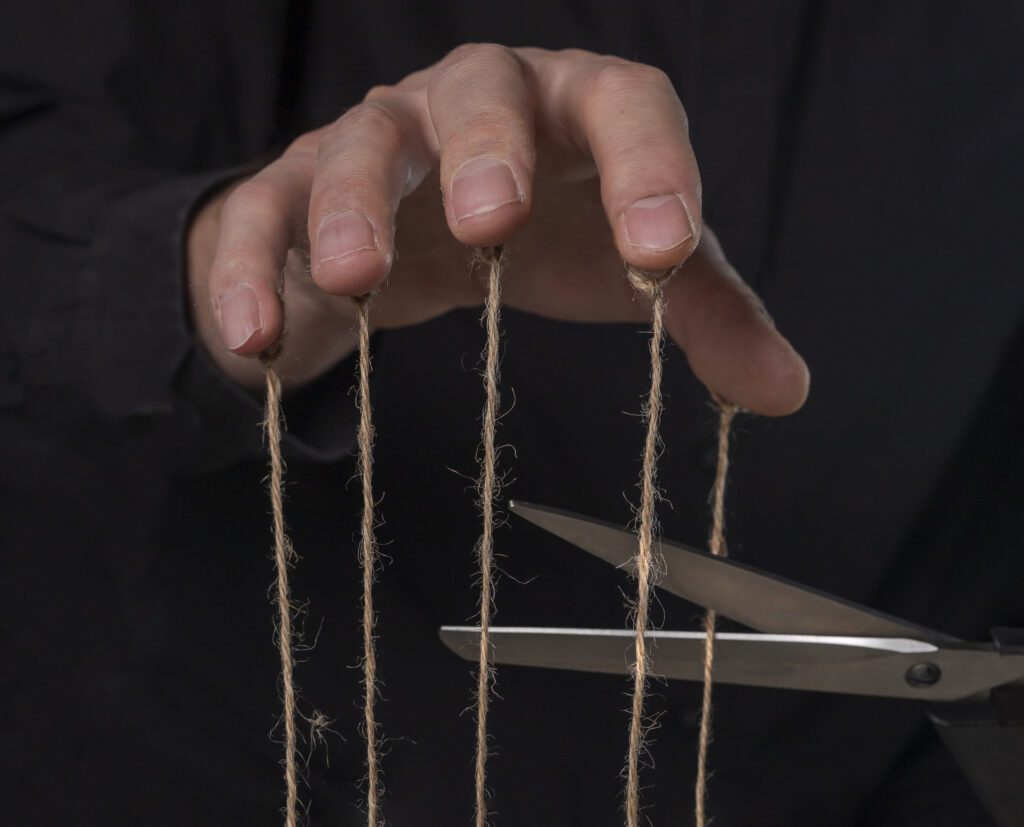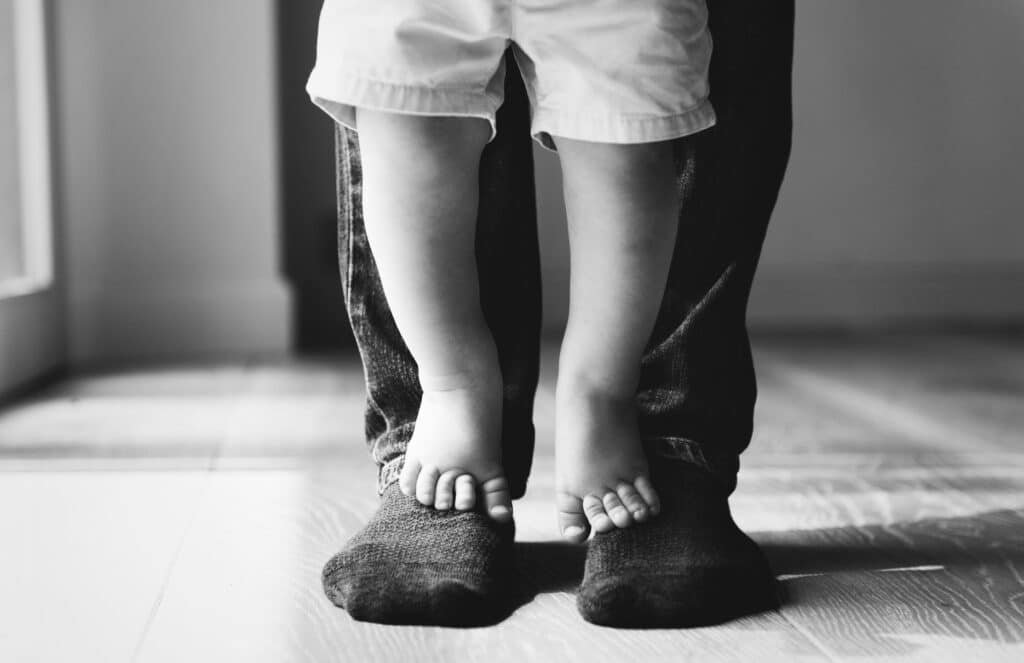Narcissistic Parents Would Rather Cut the Children in Half, Than Let Them Have Two Parents

Parental alienation is a war zone, and children are collateral damage.
It is quite common for parents who are upset by divorce to try to blame the other parent. For some individuals, failure is intolerable and can precipitate severe anxiety and depression.
In the most extreme cases, these feelings can result in delusional beliefs about the other parent, such as, for example, a mother who always stood ready to call the police during custody exchanges, believing her ex-husband might assault her, although he had never been violent.
These actions can result in severe consequences for the other parent such as the inability to see the children.
But in the end, it’s children who are suffering the most in the High Conflict Relationships.
The Tale of Solomon and the “Real Mother”
In the tale of Solomon, two women appeared before the ancient king in a dispute about a baby. Each claimed the child as her own, so King Solomon offered to cut the baby in half. One woman agreed while the other refused and offered the child to the first woman.
Solomon knew which was the real mother because he believed that a real mother would rather sacrifice her relationship with her child than see it cut in half.
Unfortunately, not all parents are willing to make such a sacrifice for their children.

When Narcissism Kicks in and Creates Havoc in a Child’s Life
To understand the contribution of narcissism to custody battles, it is necessary to examine the relationship between narcissism and parenting. In normal development, the mother is initially experienced as an extension of the infant’s self. As awareness of actual separateness sets in, anxiety, pain, and frustration become part of the infant’s experience. This awareness of others also comes with a realization of co-dependency, which stimulates additional anxiety.
The love parents feel for their children does not always reflect healthy attachment.
Mila
Parents who love their child only because the child is a part of them, or because the child loves and needs them, are experiencing a narcissistic type of love, a form of love for oneself.
As Freud said the “…attitude of affectionate parents toward their children . . . is a revival and reproduction of their own narcissism”. To put it simply:
Having children can stir up narcissism in all parents.
Mila
As Freud noted in “An outline of Psychoanalysis” and in “The standard edition of the complete psychological works of Sigmund Freud”, some aspects of parental love are fundamentally childish in nature. He even described certain aspects of parenting as “narcissism born again”.
Most parents see their newborn baby as beautiful. Other, those with narcissistic traits, go to great lengths to have complete control over the child’s environment. And it isn’t at all clear that this is done for the child’s benefit.
It appears to be for the parents’ gratification, to make up for all their own hurt and disappointment experienced in their own childhoods. The narcissism of the parent who only anxiously worries about the “best” preschool, is gratifying the parent’s own needs, but not the children’s needs.
Hurt people, hurt people.
Dr. Jamie
Pathological Narcissism in Parents and its Manifestations
Parents who engage in the High Conflict Custody disputes and have no capacity to consider their children’s needs and wishes are acting not just to gratify their own needs but are doing so at the child’s expense.
The child in such a situation is treated primarily as an extension of the parent, not as a person with needs and feelings that may be different than the parent’s and that is called “pathological narcissism”.
Parents with pathological narcissism look to their own children to have their needs for love and approval met. When their children cannot respond, these parents experience:
- Rage
- Anxiety
- Depression
A parent with pathological narcissism who engages in a custody dispute may wind up fighting for total control over how to parent the child. The narcissistic parent, on the verge of breaking down, strives for complete control over the child and the ex-spouse.
Narcissistic grandiosity can manifest in various forms, such as:
- Control over where the ex-spouse lives.
- Control over what the child eats and wears.
- A toxic belief that only that parent knows what is best for the child
- Control over where the ex-spouse lives.
- Control over the choice of religion.
- Control over school choices.
- Control over child’s extracurricular activities.
Some parents completely abandon their children. Because it crazy to spend tens of thousands of dollars on legal fees to win the right to provide a few hours of childcare, which is never guaranteed to them. However, narcissistic parents are fighting not for time with their children but instead to remain whole.

True Story – Witnessing Parental Alienation First-hand
A few months back I witnessed something dreadful.
Parental Alienation in its its purest forms. While my best friend was waiting to pick up his daughter on the court scheduled visitations times, her mother stood in the doorway, as if blocking his entrance and frowning. As the child approached the door, with her backpack in her hands, and a smile splattered across her face, her mother said:
“Aren’t you still feeling unwell baby? Perhaps it’s best for you to stay at home today and you can visit your father next time…”
The child, shocked, looked at both parents, not knowing what to do. My friend, her father, appalled came closer to his ex and reminded her politely that these are the court dates that the child is due to spend with him. He turned to his daughter and told her everything is okay and they can go, as planned. The child was reluctant, looking at her mother as if it was up for her to decide who to spend time with.
“Give Mummy a big hug, and call me as soon as you get there, so I know you are safe…”
What was said then, must have caused severe anxiety for the girl who was already traumatized at the doorstep. Perhaps she thought:
- Why wouldn’t I be safe?
- I was always safe with Daddy…what is going on?
- Will my Mummy be upset again?
- I should not go perhaps…But if I don’t will I upset Daddy…
- Will Mummy take Daddy back to court?
- Will I lose my family?!
- Is it my fault again?
From the observer’s perspective, that’s what it’s like to witness parental alienation.
The problem is that after separation narcissists don’t see others as people with wishes, desires, and hopes but they see them as objects. And it applies to their children too.
Narcissistic parents think of children as extensions of themselves. They have issues separating themselves from the children, and I’ve seen it happen in various specters. For example:
- If they are upset, they will show their upsetness to children, going as far as saying that the other parent is to blame. Which would naturally make the children want to reassure them.
No child, no matter how old, wants to see his parents cry — it’s heartbreaking. These kids are already vulnerable enough and will think that the cause of parents’ upsetness it’s their fault. So they will do all in their power to make it go away.
- If these parents feel anxious, they will project their fears onto their children. They will make them feel that the outside world, along with their other parent is unsafe.
I’ve seen people do this and go to extreme lengths telling kids that they might get kidnapped if they go on the court visitation dates with the other parent. Therefore children live in constant fear, fog, and those more vulnerable stop doing what children should do — go out, jump on the trampoline, go zip-lining, travel or just go to the nearby shop.
And if they do actually manage to go out, then only under the supervision of the alienating parent who has worked relentlessly to portray themselves as the child’s only protector and savior from all bad and ugly in this world.
Narcissists will punish their children to get back at their ex-partner. They become pawns in the game of needing to win and destroy the opponent, anyone, who is strong enough to expose their true persona.
- They will refuse to take children out, claiming that it’s because of the other parent.
- They will make false statements such as: “Your Mother/Father stopped paying child support, therefore, we can’t afford to go out.”
This causes children, who may not even understand what child support is, to feel as if the other parent is to blame, and doesn’t love them.
Narcissists will carry out a smear campaign, badmouthing the other parent and quite often they will use others (flying monkeys) to badmouth their former partner.
They will go to such lengths to try and involve the other parents’ family, first asking them to become a “meditator” but later just to have them on their side. They will come with many false allegations, especially if the former spouse doesn’t have the strongest relationship with their family, therefore the family might become perceptible to the alienator’s lies. Due to fear of losing their grandchildren and they too will become the pawns in the narcissistic game.
But what happens to those innocent children?
Parental Alienation is horrendous as it has severe effects on the development of children into healthy adults. Every child wants to be loved. Every child needs to be loved by both parents. Their parents are the center of the universe. They believe their parents know the best, especially in their pre-teen years.
When these kids are put in between their parents they are likely to feel as if:
- They are not “good enough” — why try?
- Everything is their fault — why exist?
They will feel helpless and stop pursuing their own dreams, they won’t know in the first place, what their own dreams are. This will later affect their future relationships with others, education, and career.
And they are likely to develop co-dependency issues. This may lead to unhealthy relationships with narcissists, narcotics, and other addictive substances.
Sometimes, children of narcissists become narcissists themselves and they go and abuse others, these traits can already start developing in their early teens. They can develop black and white thinking. They might demand their friends’ affection and attention and when not given, they might develop strong feelings of hatred for them.
Children become bound by the toxic generational chain of narcissistic abuse.
Mila

What can you do?
You must become a healthy role model in your child’s life. It’s crucial that you help your kids develop empathy. You can achieve this by talking to your child about feelings, discussing people, and characters in books or movies, and listening to how your child is or isn’t affected by certain situations.
Help your child develop healthy boundaries and stand up for themselves but also understand why these boundaries are created in the first place. Teaching your child to communicate, in an assertive way, and express their own opinions, wishes and dreams are essential when helping the child evade future toxic relationships.
Encourage your child to speak their own thoughts and feelings, promote their own uniqueness which doesn’t mirror you or the other parent. Help your children find their own path and create their own script for their life.
Not all children are doomed to repeat the toxic life scripts of their parents. And by having one parent that isn’t a narcissist your child already has a 50% chance to get over the emotional trauma and bring their own children into this world and stop the generational chain of abuse.
With your dedication and love, you will raise the bar, that the alienating parent would not be able to follow because you have something that they will never have — empathy.
How can Partners in Men’s Health Help You?
There is no simple intervention for these parents.
Family therapy, co-parenting counseling, and parent education groups might help; however, these programs that emphasize parenting and communication skills have been shown to be insufficient in resolving the kind of high-conflict family disputes.
Many parents going through a divorce will experience intense emotions, including rage, anxiety, fear, and helplessness. A long-term treatment that recognizes these modes of thinking, and a therapist trained to assist the patient in modifying them, will ultimately guide these parents to modify their behaviors.
At Partners in Men’s Health we believe that an essential element of successful treatment with these parents is addressing the perverse modes of thought that allow the most damaging aspects of these high-conflict divorces.
At Partners in Men’s Health, you can contact us via email or the form below and seek support, and guidance from our trauma-informed Transformational Confidential Concierge Coaching team that will help you get “out of the fog and into the light.”
PMH is run by Dr. Jamie, the Clinical Conductor of this Transformational Team. He is a trauma-informed Psychologist, Licensed Clinical Social Worker, and Certified Compassion Fatigue Therapist. For 30 years, he has been helping people overcome their traumatic, degrading experiences using a comprehensive trauma-informed approach that lifts the mind and spirit in difficult situations when dealing with Toxic Abusive Relationships.
Dr. Jamie has been an expert witness in family courts and in landmark national cases for the past 25 years. As an expert witness, he can lead you to a greater likelihood of victory in a court. He can clinically explain a complicated process so the jury or judge can make a final decision based on the clinical facts of the case.
Dr. Jamie has been the right expert witness for lawyers and the families they represent in high conflict relationship matters. He can hone a unique, customized approach to identifying, analyzing, and connecting with those attorneys and other officers of the court and whose who clearly need to understand these important relationship dynamics.
Like the article?
Get in touch with Mila
Did you relate to this article? Would you just like to confidentially discuss your experiences? If you have any questions, suggestions or would just like to get in touch with me, please be free to do so, using this confidential form. We will not sell or distribute your email address to any third party at any time. Read our Privacy Policy.